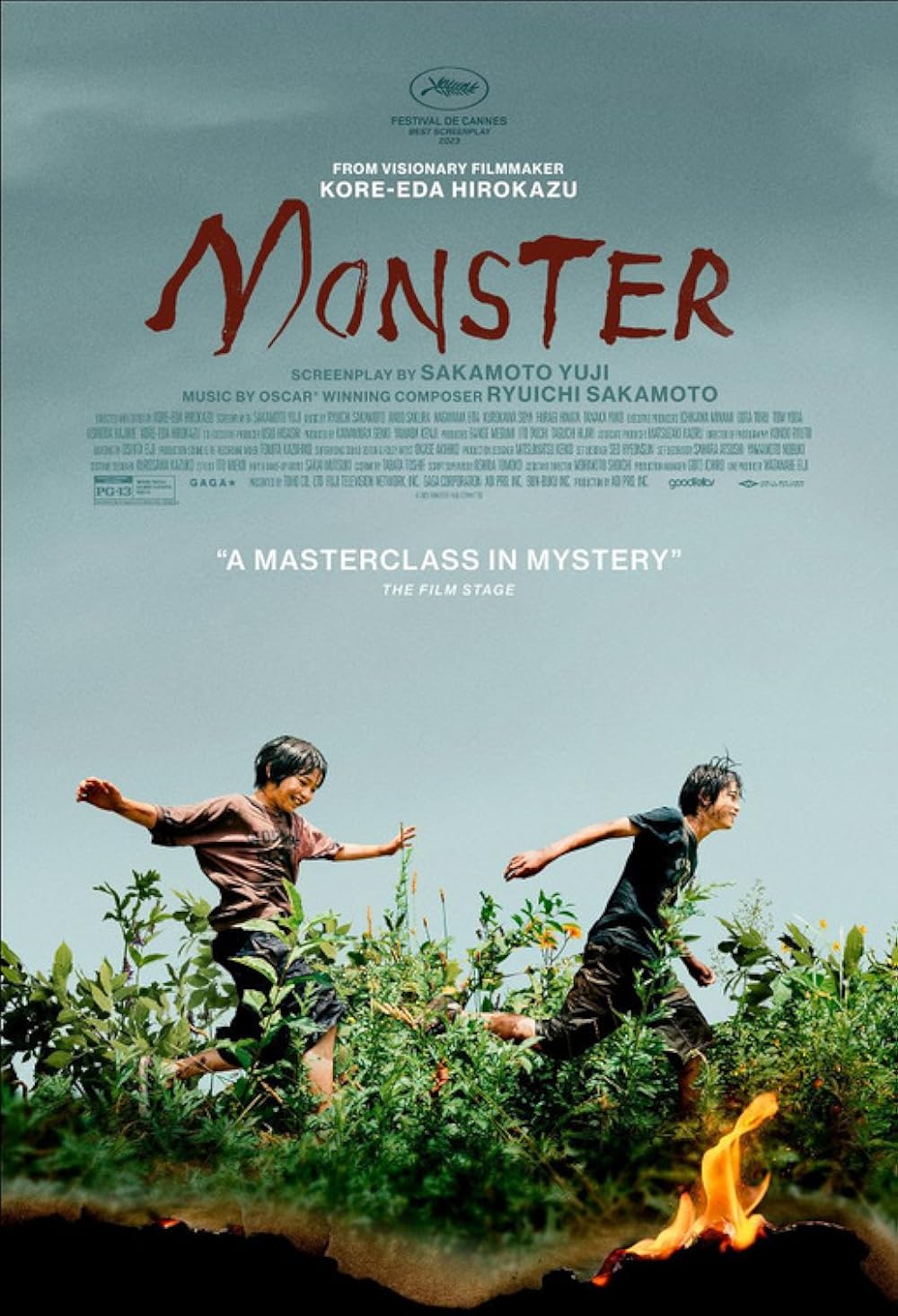Movies
Who is the monster?
Directed by Hirokazu Kore-eda, ‘Monster’ portrays a tale of identity, complex relationships and social expectations through the perspectives of a single mother, her son and a teacher.
Aarati Ray
Japanese movies are known for their mysterious allure and in this mysterious world, director Hirokazu Kore-eda’s 2023 thriller ‘Monster’ stands out as a masterpiece that tells a story of identity and the complex connections between people.
The film opens with a striking scene of a building engulfed in flames, while Saori (Sakura Ando) and her son Minato (Soya Kurokawa) watch from a distance. This fiery start serves as a prelude to the audience stepping into a world of unanswered questions and mystique.
The story starts with Saori, a single mother, observing her son Minato’s peculiar behaviour. Kore-eda’s adept directorial skills shine through as the film skillfully conveys the inner thoughts and emotions of the characters through nuanced details.
Characterisation through unspoken, little details yet again adds weight to the implicit message behind the movie, which deals with important themes like bullying, homophobia and how family dynamics affect kids’ lives.
The story is told from three different perspectives—the mother, the teacher and the son. As each part is revealed, you learn more, and who you might think is the “monster” changes. It’s like putting together a puzzle where pieces start to make sense, but thanks to Kore-eda and screenwriter Yuji Sakamoto, you never get the full picture. Their direction and execution of the scenes make the truth and what people see more unclear, which could be a satire of how we quickly judge things nowadays.
The story, told in about two hours, shows the skill of storytelling. It’s like a dance through the feelings of each character, making us understand them before surprising us with different points of view, which at some point is quite frustrating. The pictures and scenes created by Kore-eda add more meaning to the story, making it both visually and emotionally rich.
The efforts in setting mood, tone and subjective reality are evident in each frame of the movie. For instance, the movie starts by showing a burning building from different angles, symbolising how there is no single reality—the truth can be multiple and have many sides.
Similarly, when Saori suspects Minato’s teacher, Mr Hori (Eita Nagayama), this leads to a series of events, riddled with doubts and misunderstandings. In the movie, we see that adults in the classroom try to conceal things which gives a message of how authority can be complicated and affect kids. The careful attention to mood and subjective reality allows the audience to immerse themselves in the characters’ struggles.
Another noteworthy element of ‘Monster’ is the music, composed by Ryuichi Sakamoto—his last work. The melancholic sounds of the piano, paired with tense scenes, especially the one where Minato says, “My brain was switched with a pig’s,” manages to bring tears to all of our eyes.
In a scene towards the end of the movie, the principal and another student use musical instruments to express the truth, showing how even the most difficult things to say aloud can be expressed. The music intensifies the emotions conveyed in the movie.
The performances in ‘Monster’ are nothing short of outstanding. Ando gives Saori a lot of depth, showing the difficulties of being a mother and societal expectations. Likewise, Nagayama does a great job of showing Mr Hori’s loneliness and desire for love in a subtle manner.
The young actors, especially Soya Kurokawa and Hinata Hiiragi, portray Minato and Yori very sincerely. Their portrayal and understanding of queer elements in the story have been handled with care and honesty, which shows that filmmakers and actors have done thorough research and consulted with the LGBTQIA+ community for the right representation and better understanding.
In the latter part of the film, it is revealed that Minato struggles with his feelings for Yori, and the audience finds the reason behind the changes in him that his mother speculated to be the result of something darker.
The interaction between Minato and Yori is portrayed subtly. The intentional irregular and nonlinear structure of ‘Monster’ prompts the audience, like Minato’s mother, to initially speculate on darker possibilities before understanding Minato’s true struggle.
Through Minato, the movie sheds light on the challenge of acknowledging one’s queerness at a young age and its impact on self-perception and relationships.
The movie also shows great juxtaposition between internal and external struggles. It sheds light on the internal struggles faced by individuals who don’t conform to societal norms regarding sexuality, as well as the constraints on the mother imposed by societal expectations and the teacher constrained by the school system and societal perceptions of manhood.
The film tackles difficult subjects like child abuse and new relationships, effectively portraying how societal expectations weigh heavily on these young characters, leading to moments of palpable frustration and anxiety. It is simultaneously tragic and beautiful. In the end, as the two boys run under the bright sun, it shows the stark contrast between the challenges of the real world and the special world they created.
The typhoon in the story is symbolic too, as it represents the pain and problems in society, while the sunshine stands for a place where love is not restricted by society’s rules. The ending is upsetting and makes us question why the societal systems couldn’t protect these young characters.
‘Monster’ reminds me of ‘Rashomon’, a classic multiple-perspectives movie released in 1950. Similar to ‘Rashomon’, each character of ‘Monster’ becomes a different person in each retelling. The people remain the same, but the monster seems to be in different places.
Still, the different perspectives and narratives on the same event in ‘Monster’ make it quite confusing for the audience. It gets challenging to keep up with all the different storylines and also brings forth confusion on what and whom to trust.
Likewise, the ambiguous and open-ended ending might leave some audiences frustrated and disappointed with the recurring pattern of movies with queer themes concluding sadly or having unclear endings.
Nevertheless, ‘Monster’ showcases Kore-eda’s ability to capture human emotions exceptionally well. Collaborating with Sakamoto and the talented actors, they’ve crafted a film that goes beyond mere storytelling. The film focuses on looking at things from different angles, hidden truths and an exploration of the complexities of relationships and life.
Monster

Director: Hirokazu Kore-eda
Cast: Sakura Ando, Eita Nagayama, Soya Kurokawa, Hinata Hiiragi
Year:2023
Language: Japanese
Duration: 2 hours 6 minutes
Available on Apple TV and iTunes




 14.24°C Kathmandu
14.24°C Kathmandu












